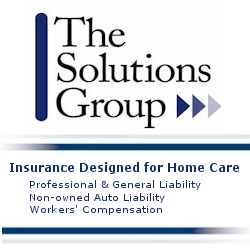 As we are talking to clients and customers, we try to take note of questions asked about different insurance issues. David Dickie, at The Solutions Group, is always happy to provide answers and some other information about some common insurance questions for our readers, since our clients and customers aren’t the only ones overwhelmed by insurance.
As we are talking to clients and customers, we try to take note of questions asked about different insurance issues. David Dickie, at The Solutions Group, is always happy to provide answers and some other information about some common insurance questions for our readers, since our clients and customers aren’t the only ones overwhelmed by insurance.
One of the first areas of common concern is employment practice claims. So we asked David, “What is an employment practices claim? What insurance policy covers such things? And what typical scenarios in home care lead to claims?”
An employment practices claim is an employee action against an employer for damages due to any of the following:
- Wrongful Termination
- Discrimination (Age, Race, Sexual Orientation)
- Workplace Harassment
- Employment Related Defamation
- Invasion of Privacy
- Retaliation
- Violation of FMLA
- Breach of Written Employment Contract
In addition to the list above, the home care industry is also subject to third-party claims; for instance if a client creates a hostile work environment for a caregiver by repeatedly making harassing comments.
General and professional liability policies typical to home care agencies exclude employment practices claims from coverage. A special policy is needed for employment claims, called employment practices liability insurance (EPLI).
What scenarios can result in employment practices claims?
- A caregiver is hurt on the job and is on workers compensation disability for a period of time. When released back to work, there is no job available.
- An employee handbook details a disciplinary procedure of two warnings with intervention prior to termination. A caregiver is given one warning with regard to late arrival and then terminated.
- An employment advertisement is placed in a local newspaper that states ‘English must be a first language’.
- An agency consistently places caregivers of only the same race as the client.
We have seen an uptick in employment practices claims in the home care industry. Here are seven reasons to consider employment practices liability insurance:
- Every employer, large or small, can be the target of legal action from past, present, and prospective employees.
- Employee lawsuits are 1,000 times more likely to occur than a fire.
- Employees filed 93,727 charges with the U.S. Equal Employment Opportunity Commission in 2013. For pure terror, take a look at www.eeoc.gov.
- Employees can easily file lawsuits at no cost, with no risk to them.
- Employees win 70% of jury trials.
- A ‘Jury of Your Peers’ is unlikely to have even one business owner on it.
- Defense costs can easily exceed $100,000, even if you did nothing wrong.
Another common area of concern with home care company owners is caregivers driving on the job. What do I need when it comes to caregivers driving on the job?
According to David, from a home care perspective, on the job driving typically falls into one of the following categories:
- Driving from one client’s home to another.
- Driving on behalf of a client (to pick up something or drop off something).
- Transporting a client.
Typically, the commute from home to the first patient is NOT considered on the job. However, driving between patients’ homes or transporting patients is clearly on-the-job.
So, when planning how to protect your agency, your employees and your clients, make sure your insurance coverage takes these conditions into consideration.
Another question we get quite often is should the client’s car or the caregiver’s car be used? David had the following to say on this question. “From a coverage perspective, it does not matter. However, from a ‘loss control’ perspective, it is much better to take the client’s car for two reasons:
1. The client typically has a nicer, safer and better maintained vehicle than the caregiver.
2. The client assumes some risk by lending his/her car to a caregiver to drive. That perceived assumption of risk helps in the event of a claim.”
David also recommends doing a motor vehicle records check on your employees to avoid a “Negligent Entrustment” claim.
Obviously there is a lot more to both of these topics than can be adequately covered in a blog post, so please do not hesitate to let us know if you have any further questions, or you can always contact The Solutions Group to answer questions about your insurance needs.
When someone asks us about insurance for a private duty home care company, we point them in the direction of The Solutions Group. The feedback we get regularly from clients, customers, and readers who have purchased their insurance from David Dickie has been amazing.
When you are working with a referral source, you want them getting amazing feedback about you and your home care company. When I started getting amazing feedback about The Solutions Group, it reinforced our decision to send everyone who asks to them for insurance.
If you are faced with a decision about who to go to for insurance for your company, just click on the link and get more information about The Solutions Group. Then tell them that Leading Home Care sent you.



